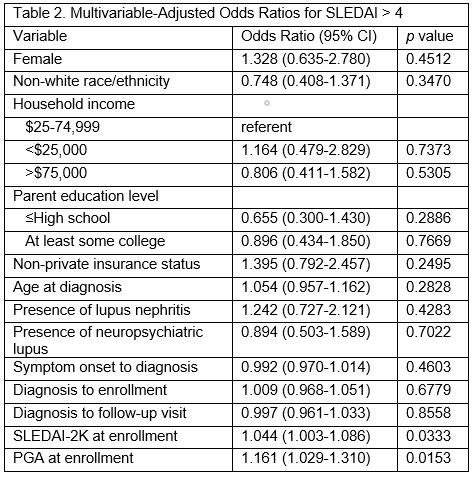Session Information
Date: Monday, November 9, 2020
Title: Pediatric Rheumatology – Clinical Poster III: SLE, Vasculitis, & JDM
Session Type: Poster Session D
Session Time: 9:00AM-11:00AM
Background/Purpose: Patients with childhood-onset systemic lupus erythematosus (cSLE) are at high risk for early morbidity and mortality, but predictors of moderate/high cSLE disease activity have not been well-studied. Our objective was to determine sociodemographic and clinical predictors for moderate/high disease activity scores in a cohort of North American cSLE patients. Our hypothesis was minority race/ethnicity, lower household income, lower parental education, and non-private insurance status would be associated with moderate/high disease activity at follow-up.
Methods: The Childhood Arthritis and Rheumatic Disease Research Alliance (CARRA) Registry enrolls patients with cSLE from >65 North American pediatric rheumatology centers. We performed a cross-sectional analysis of CARRA Registry data collected prospectively from March 2017 to December 2019. Patients with cSLE or probable cSLE with at least two study visits at least 6 months apart were included. Disease activity at most recent follow-up visit was measured using Systemic Lupus Erythematosus Disease Activity Index 2000 (SLEDAI-2K, range 0-105) and dichotomized as low disease activity, SLEDAI-2K ≤ 4, or moderate/high disease activity, SLEDAI-2K > 4. Chi-square and two-sample Student t tests were performed to compare sociodemographic and clinical characteristics between patients with low vs. moderate/high disease activity at most recent follow-up. Multivariable logistic regression was conducted to determine predictors for SLEDAI-2K > 4 at most recent follow-up.
Results: There were 423 eligible patients with cSLE (Table 1). The mean ± SD time from diagnosis to most recent follow-up was 27.1 ± 22.2 months. The cohort was 85% female, 27% Black, 25% White, 24% Hispanic, and 17% Asian with a mean ± SD age at diagnosis of 13.8 ± 2.9 years. Lupus nephritis was present in 41% and neuropsychiatric lupus in 28%. At the most recent visit, the range of SLEDAI-2K scores was 0-25, and 27% of patients had SLEDAI-2K > 4. Results of univariate analyses showed there were not statistically significant differences in sociodemographic variables between patients with low vs. moderate/high disease activity (Table 1). However, patients with moderate/high disease activity at most recent follow-up had statistically higher number of ACR and SLICC criteria, SLEDAI-2K at enrollment, and physician global assessment (PGA) at enrollment and shorter time from diagnosis to enrollment (Table 1). Using multivariable logistic regression adjusted for disease duration, SLEDAI-2K at enrollment (OR=1.04, 95% CI=1.003–1.086) and PGA at enrollment (OR=1.16, 95% CI=1.029–1.310) remained independently associated with moderate/high disease activity.
Conclusion: This analysis demonstrates a substantial proportion of patients with cSLE in the CARRA Registry have moderate/high disease activity at most recent follow-up. Disease activity at registry enrollment, measured by SLEDAI-2K and PGA, was the only predictor of moderate/high disease activity. Interestingly, sociodemographic characteristics did not predict moderate/high disease activity. Improved understanding of modifiers of cSLE disease activity is needed for the development of targeted interventions to improve outcomes.
 Table 1. Sociodemographic and Clinical Predictors of Disease Activity at Most Recent Follow-up Visit
Table 1. Sociodemographic and Clinical Predictors of Disease Activity at Most Recent Follow-up Visit
 Table 2. Multivariable-Adjusted Odds Ratios for SLEDAI > 4
Table 2. Multivariable-Adjusted Odds Ratios for SLEDAI > 4
To cite this abstract in AMA style:
Smitherman E, Chahine R, Beukelman T, Knight A, Rahman A, Son M, Curtis J, Hersh A. Sociodemographic and Clinical Predictors of Childhood-Onset SLE Disease Activity in the Childhood Arthritis and Rheumatology Research Alliance Registry [abstract]. Arthritis Rheumatol. 2020; 72 (suppl 10). https://acrabstracts.org/abstract/sociodemographic-and-clinical-predictors-of-childhood-onset-sle-disease-activity-in-the-childhood-arthritis-and-rheumatology-research-alliance-registry/. Accessed .« Back to ACR Convergence 2020
ACR Meeting Abstracts - https://acrabstracts.org/abstract/sociodemographic-and-clinical-predictors-of-childhood-onset-sle-disease-activity-in-the-childhood-arthritis-and-rheumatology-research-alliance-registry/
